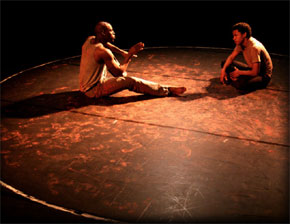Yesterday was a real milestone on my placement. It was a day which started early with prayers, worship and a walk around the area then straight back to the office to work on preparations for the Art Cafe and my sermon on Sunday. Real break-throughs on both of these and lots to reflect on but the real major event was a meeting with Rob Gillion who I spoke about before (see ‘London Calling (part III)’ post) and the Bishop of Kensington, the bishop overseeing and sponsoring my training. Both conversations led me to reflect on my personal ministry and on ‘theatre church’.
As I met Rob, rushing back from a hospice visit, I was struck by how much respect I had for him despite only having met him once before. I have been impressed by his humility and honesty of weaknesses and ‘failures’ of his past ministry as well as the strengths and ‘successes’. It helps, of course, that our hearts have been set to beat for similar things and there was, as we walked side by side towards a Knightsbridge brasserie, a real sense of a partnership forming, two men passionate about God’s involvement in the theatre and a call to go into those places and be representatives to those communities.
The conversation buzzed with questions, discoveries, sharing ideas and concerns and there were moments of silence where I felt God sitting smiling at the two of us. I felt like we were two actors discovering truth in the script we’re working with and asking important questions, all the time the director sitting quietly observing and posed to step in at the right moment.
The work of InterMission has the same principles, from what I can gather, as the community I want to establish in Durham and I use the word ‘principle’ intentionally. Rob (and I agree) strongly believes that the Kingdom of God will not be built by master plan or blueprints but by organic principles. Throughout our conversation I was thinking how much Rob would love to read ‘Organic Community’ which has led me into a journey of discovery. The principles that InterMission are based upon are hospitality, exploration and rest.
What struck me about InterMission was there was a real sense of creating a home for people. Church should be a place where you are yourself where work stops and where rest begins. This challenged some aspects on ‘Theatre Church’. Do actors need to engage in faith through what they ‘do’ for work? InterMission is looking at how we make a ‘home’ for artists. Thiis really resonates with the cultural situation in the theatre at the moment.
With the funding cuts and the real shift away from traditional ways of ‘doing’ theatre, companies which have a core membership of artists are shrinking and actors are needing to ‘float’ around various companies; for one season they’ll be with one then they’ll move on. This means that they are settling in a pattern of life that requires little commitment because no company ask commitment of them, and they are without a solid home. Friends of mine struggle to settle down roots because the work calls them away to different places all the time.
Rob has struggled with these issues. Church demands commitment. Commitment is needed in order for growth in discipleship to occur but with people who can’t commit due, not only to some personality types, but mainly because their work demands that they don’t commit. Church should also be a home, a resting place, a place where they take off masks and become themselves. Actors find this difficult. Theatre is a holistic vocation; it becomes your social life, work life and, sometimes, your spiritual life. How could ‘Theatre Church’ effectively speak into this? Rob is attempting to create a home where actors can rest but he has struggled.
My challenge is whether doing church in a rehearsal structure is too much like work? Am I creating difficulties by attempting this format? From the experiences of intermission I am aware that this type of work is useful but it needs to be balanced with a real sense of the calling to be ‘home’ and to challenge the actors to embrace themselves and allow themselves to discover who they are.
The final thing that I took away from my chat with Rob is not just encouragement that this work is worthwhile but that this work is difficult. The type of ministry that this is shaping into is not ‘successful’ is not immediately fruitful and is counter-cultural for both the Church and the theatre and so where is the support? Who will ‘get this’? This work is experiential not quantifiable; you see the worth by experiencing it rather than weighing up the pros and cons. This work is a risk and, I believe, a risk worth taking. Sound familiar? Jesus’ call to disciples is not quantifiable but experiential…






